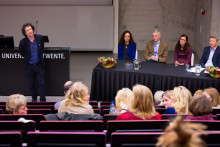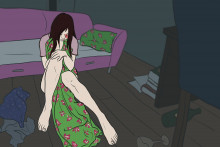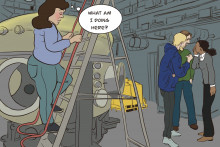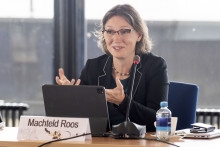The open discussion on the topic #MeTooUT was held yesterday in the Waaier. One of the main goals of the event was to discuss how to ensure that the University of Twente provides a safe environment for all its employees and students. ‘It was an eye opener for me when - during a meeting with female colleagues on how to progress in one’s career – we weren’t even talking about the glass ceiling, but about not feeling safe in the workplace,’ mentioned Vanessa Evers, underlining the relevance of the subject at hand.
Boundaries
Feeling safe during interactions with co-workers relates to boundaries. ‘On top of physical boundaries, which could be clearly defined, we all have personal and emotional boundaries which are hard to formalize and therefore fall into a grey area,’ said Peter-Paul Verbeek. Members of the audience agreed that it is difficult to create rules in this grey area, but stated that the issues should be dealt with, nonetheless. Communication is key, according to some. ‘It should be okay to say “I’m not okay”, point out the moments that make us uncomfortable,’ stated one participant of the discussion.
Open discussion at the Ut
The event was organized by the Ambassador's Network and the Female Faculty Network of the UT (FFNT), focused on the general topic of sexual harassment and on UT policies and procedures related to it. The discussion was led by Peter-Paul Verbeek and included a panel consisting of Thom Palstra (Rector Magnificus), Joost Sluijs (HR), Vanessa Evers (EEMCS) and Melanie Braamhaar (UT Confidential Advisor).
Blacklists or meetings behind closed doors?
However, to openly state that we feel uncomfortable isn’t always easy. ‘The issue lies in the power relationship,’ a researcher in the audience pointed out. ‘You feel like you can’t get out of the situation. As a scientist, you are usually highly specialized in one field. If you report the issue, you might lose your position and the alternative is to leave science. And even if you win your case, you will still meet the perpetrator at conferences and they can get back at you through the review system.’
To solve this, there was a suggestion to put perpetrators on a ‘blacklist’ and ‘not cover things up’. ‘I’m not sure if it will help us to publicly state “this person is bad”,’ responded UT rector Thom Palstra. ‘Nowadays, people are often vilified in the media. I believe we should make sure only relevant people are involved and deal with the issue.’
'Aren't we all relevant people?'
‘Aren’t we all relevant people?’ a student asked the rector in return and several reactions from the audience followed. ‘If something is serious enough to fire someone, it's serious enough to let this community know,' was one of them; while others suggested that at least anonymized examples should be publicly shared: ‘It might be easier if at least the numbers of complaints are available, so people don’t feel alone and come forward. We don’t need to publicly shame people, but the community needs to know that the issues are dealt with appropriately.’

Clear code of conduct
Having such information available could also help to clarify how people can proceed if they experience any sexual harassment or power abuse. ‘It might be helpful to have a clear UT-wide code of conduct,’ said Peter-Paul Verbeek. ‘At schools, they have specific interventions to stop bullying. Children give a clear signal to the bully to let him or her know that they are in the danger zone. Perhaps we could have a clearer procedure on how to report issues.’
'I don’t think it is women’s job to teach men how to be decent human beings'
‘On the other hand, I don’t think it is women’s job to teach men how to be decent human beings,’ remarked one of the event’s participants and Vanessa Evers agreed: ‘I don’t want the responsibility to report issues. I – and we all – deserve an environment where it doesn’t happen.’ Joost Sluijs (HR) then proposed we should create better general awareness and educate everyone on the issues related to sexual harassment, perhaps even dedicate one day a year to it as is common in the U.S.
Most issues related to sexual harassment at the UT currently end up in the office of the four university confidential advisors. To protect the people that turn to them, the advisors never ‘go public’ with the information unless the victims fully agree. They also don’t share information among each other, which means several cases related to one perpetrator might get overlooked. ‘As a standard we don’t discuss our cases, but it might be a good idea to do that, so we pick up the signals that something is wrong,’ said Melanie Braamhaar.
‘We shouldn’t keep quiet’
More transparency and shared responsibility seemed to be the topics yesterday’s discussion kept coming back to. ‘It is not only about individuals, but about entire communities. Some communities are poisonous and that is something we need to work on - also within academia,’ said Thom Palstra. To the comments about limited options of scientists, who generally function in a highly hierarchical structure, Palstra added: 'I don’t think you have no options as a scientist. You can walk away and work on another topic.’
‘Walking away is not an option,’ disagreed a scientist in the audience. ‘That is what everyone does know. If we all walk away because it’s easier, we won’t change anything. We should disclose cases. We shouldn’t keep quiet.’







